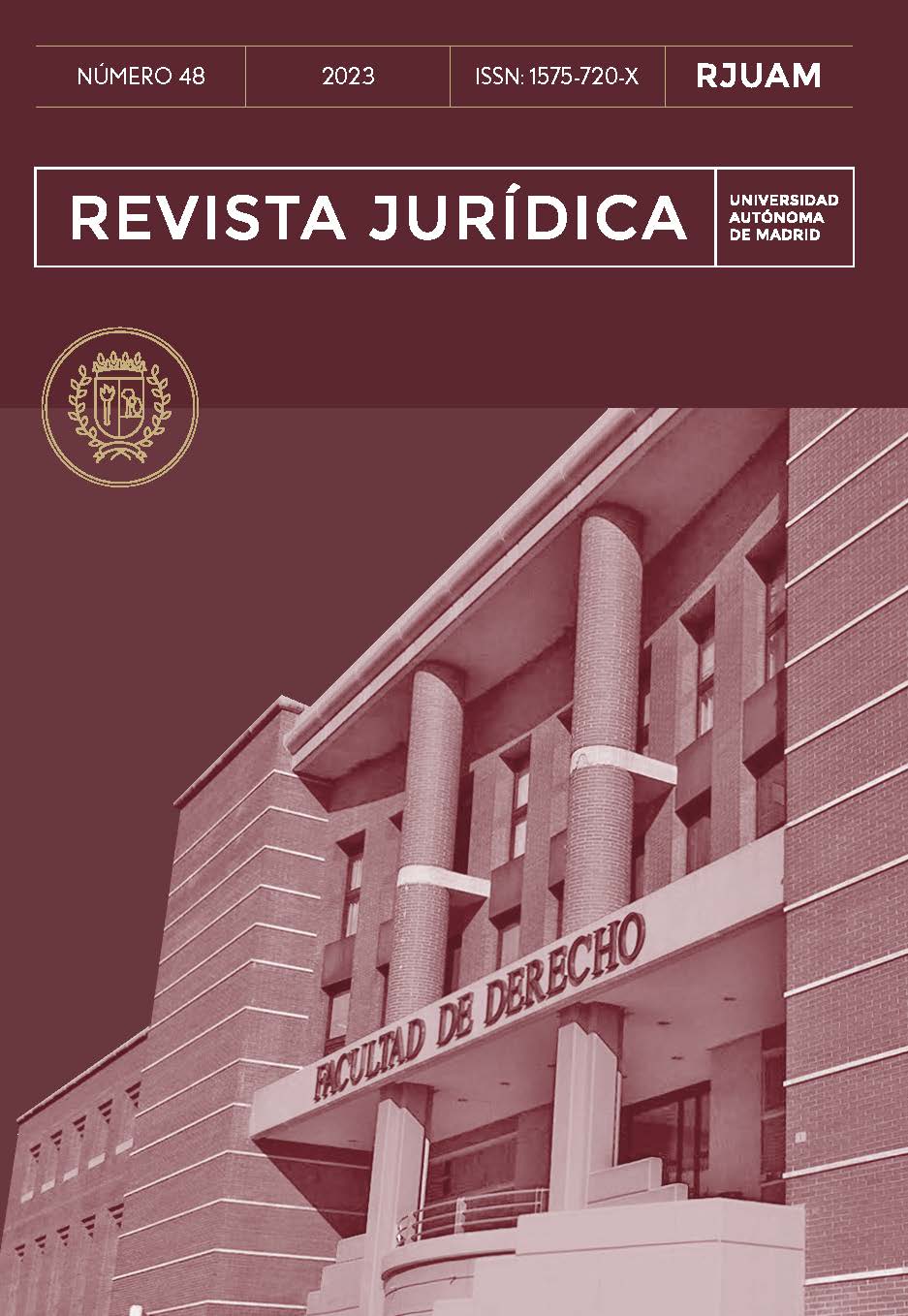On the necessity and possibility of violence in the conceptualization of civil disobedience
Keywords:
civil desobedience, violence, political participation, fidelity to lawCopyright (c) 2024 Revista Jurídica Universidad Autónoma de Madrid

This work is licensed under a Creative Commons Attribution-NonCommercial-NoDerivatives 4.0 International License.
Abstract
Civil disobedience is one of the most drastic and significant forms of political participation that a social movement can resort to in order to assert its claims to justice in the public arena. However, classical conceptualizations of civil disobedience, insofar as they consider the use of violence to be radically incompatible with this form of protest, have limited the scope of this phenomenon exclusively to the context of Western democracies. Thus, this paper seeks to analyze the relationship between civil disobedience and violence, trying to determine in what contexts and under what circumstances the use of violence by the disobedient is justified, arguing that its justification depends on the sense of justice of the majority and the type of violence perceived as acceptable in a given society. It also discusses the use of violence by political authority, examining the role of punishment and repression in determining how civil disobedience, as a form of political participation, must show fidelity to the law.
Downloads
References
ADAMS, N. P., «Uncivil Disobedience: Political Commitment and Violence», Res Publica, núm. 24 (4), 2017, pp. 475-491.
ARENDT, H., La crisis de la República, Madrid (Trotta), 2015.
ARENDT, H., Sobre la violencia, 3.ª Ed., Madrid (Alianza), 2018.
BALLESTEROS-PELUFFO, G. L., «Noviolencia y desobediencia civil», Desafíos, vol. 24, núm. 2, 2012, pp. 45-68.
BEDAU, H. A., «On Civil Disobedience», The Journal of Philosophy, vol. 58, núm. 21, 1961, pp. 653-665.
BUTLER, J., La fuerza de la no violencia, Barcelona (Paidós), 2021.
CHENOWETH, E., PERKOSKI, E., y KANG, S., «State Repression and Nonviolent Resistance», Journal of Conflict Resolution, núm. 61(9), 2017, pp. 1950–1969.
CRUZ ORTIZ, L.M., «La obligatoriedad en sentido jurídico y las pretensiones del derecho», Persona y Derecho, vol. 76, 2017, pp. 115-147.
DAVENPORT, C., «State repression and political order», Annual Review of Political Science, vol. 10, 2007, pp. 01-23.
DEMERITT, J., «The Strategic Use of State Repression and Political Violence», Oxford Encyclopedia of Empirical International Relations Theory, 26 de octubre de 2016. Disponible en: <https://doi.org/10.1093/acrefore/9780190228637.013.32> [Consultado el 26/12/2023].
DWORKIN, R., Taking Rights Seriously, Londres (Bloomsbury Publishing), 2013.
FERNÁNDEZ GARCÍA, E., «La obediencia al Derecho», en: PECES-BARBA MARTÍNEZ, G., (coord.), Educación para la ciudadanía y Derechos Humanos, Madrid (Espasa), 2007, pp. 261-273.
FISAS, V., Cultura de paz y gestión de conflictos, Barcelona (Icaria), 1998.
GALTUNG, J., Paz por medios pacíficos. Bilbao (Bakeaz), 2003.
HABERMAS, J., Ensayos políticos, Barcelona (Península), 2002.
ILIVITZKY, M. E., «La desobediencia civil: aportes desde Bobbio, Habermas y Arendt», Confines de relaciones internacionales y ciencia política, vol. 7, núm. 13, 2011, pp. 15-47.
LABOSSIERE, B.B., «When the Law Is Not One's Own: A Case for Violent Civil Disobedience», Public Affairs Quarterly, vol. 19, núm. 4, 2005, pp. 317-330.
LANG, B., «Civil Disobedience and Nonviolence: A Distinction with a Difference», Ethics, núm. 80 (2), 1970, pp. 156-159.
MARCOU, A., «Violence, communication, and civil disobedience», Jurisprudence, núm. 12 (4), 2021, pp. 491-511.
MØLLER, J. y SKAANING, S., «Marshall Revisited: The Sequence of Citizenship Rights in the Twenty-first Century», Government and Opposition, vol. 45, núm. 4, 2010, pp. 457-483.
MORARO, P., «Violent Civil Disobedience and Willingness to Accept Punishment», Essays in Philosophy, núm. 8 (2), 2007, pp. 270-283.
MORREALL, J., «The Justifiability of Violent Civil Disobedience», Canadian Journal of Philosophy, núm. 6 (1), 1976, pp. 35-47.
THOREAU, H.R., Desobediencia civil y otros escritos, Madrid (Alianza), 2012.
PECES-BARBA MARTÍNEZ, G., «Desobediencia civil y objeción de conciencia», Anuario de derechos humanos, núm. 5, 1988, pp. 159-176.
PEREIRA SÁEZ, C., «El derecho de resistencia en nuestro mundo postmoderno», Persona y Derecho, núm. 71, 2014, pp. 257-273.
PLATÓN, Diálogos I. Apología de Sócrates, Critón, Eutifrón, Hipias Menor, Hipias Mayor, Ion, Lisis, Cármides, Laques y Protágoras, Madrid (Gredos), 2019.
PULIDO ORTIZ, F.E., «La fuerza del derecho: sanciones, coerción y coacción», Persona y Derecho, vol. 81, 2020, pp. 151-183.
RAWLS, J., Teoría de la justicia, 2.ª ed., México (Fondo de Cultura Económica), 1995.
RAZ, J., The authority of law: Essays on law and morality, Oxford (Clarendon Press), 1979.
SÁNCHEZ-OSTIZ, P., «Coacción, intimidación y coerción en Derecho penal», Persona y Derecho, vol. 81, 2020, pp. 185-200.
SARTORI, G., La democracia en 30 lecciones, Madrid (Taurus), 2009.
SCHAUER, F., The Force of Law, Cambridge-Massachusetts (Harvard University Press), 2015.
STEPHAN, M. J., y CHENOWETH, E., «Why Civil Resistance Works: The Strategic Logic of Nonviolent Conflict», International Security, núm. 33 (1), 2008, pp. 7–44.
SUTTON, J., BUTCHER, C. R., y SVENSSON, I., «Explaining political jiu-jitsu: Institution-building and the outcomes of regime violence against unarmed protests», Journal of Peace Research, núm. 51 (5), 2014, pp. 559–573.
TODD, A., Las revoluciones, 1789-1917, Madrid (Alianza), 2000.
VELASCO ARROYO, J. C., «Tomarse en serio la desobediencia civil. Un criterio de legitimidad», Revista Internacional de Filosofía Política, núm. 7, 1996, pp. 159-184.
WEBER, M., Economía y sociedad, 2.ª ed., México (Fondo de Cultura Económica), 1964.
